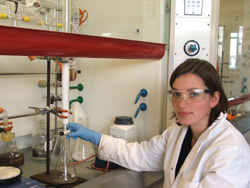Posted: 05 May 2006
CSCB awards €960,000 in PhD studentships to UCD researchers
The Centre for Synthesis and Chemical Biology (CSCB) has awarded twelve PhD studentships with a total value of €960,000 to UCD researchers.
The successful projects were selected by an external panel of academics, chaired by Dr Janet Allen, Director of the UCD Conway Institute. Each project is closely aligned to the research goals of the CSCB, which include discovering and developing novel therapeutic agents for medicine and improving our understanding of the chemical-biological processes of life and the environment.

Ms Therese Brennan, a PhD student with Professor Pat Guiry
The postgraduates who received the awards will be working with the following CSCB Principal Investigators:
Dr Hasim Ibrahim, Professor Pat Guiry, Professor Michael McGlinchey, Dr Paul Murphy, Dr Donal O'Shea, Dr Matthias Tacke, and Dr Xiangming Zhu
UCD School of Chemistry and Chemical Biology
Dr Patrick Caffrey, Professor Paul Engel and Dr Jens Nielsen
UCD School of Biomolecular and Biomedical Science
Dr Cosima Stubenrauch
UCD School of Chemical and Bioprocess Engineering
Dr Eoin Casey and Dr Cormac Murphy (joint PhD studentship)
UCD School of Chemical and Bioprocess Engineering
UCD School of Biomolecular and Biomedical Science
Promoting collaboration between CSCB researchers is key and the joint PhD studentship with Dr Eoin Casey and Dr Cormac Murphy will enable a postgraduate to examine the removal of toxic compounds from waste streams using a Pseudomonas biofilm. ‘The clean up of waste streams that contain toxic compounds like halogenated xenobiotics is of major environmental and industrial concern, and we propose to use an emerging technology called microbial biofilms to remove such toxic compounds," explains Dr Murphy.
Many of the principal investigators are carrying out research in the hope of discovering new therapeutic agents for diseases. Professor Paul Engel has outlined a project to study Glutamate Dehydrogenase as a potential anti-malarial target. Malaria is one of the world's main killer diseases, and although it was considered to be on the decline 30 to 40 years ago following the banning of DDT, and in light of the increasing resistance to the current anti-malarials, there is a desperate need for new drugs to combat this disease today.
Amphotericin B is an effective but highly toxic antifungal antibiotic that is also active against Leishmania parasites, prion diseases and enveloped viruses. However, over a number of decades medicinal chemistry has not produced a safe semi-synthetic derivative that is economically viable. Dr Patrick Caffrey's research project will use synthetic biology to produce non-toxic amphotericin derivatives in large quantities. "Genetic engineering can be used to manipulate the biosynthesis of complex natural products in bacteria. This approach promises to yield new bioactive compounds for the treatment of disease. The CSCB grant will allow us to extend our contributions to this area," says Dr Caffrey.
Dr Cosima Stubenrauch's postgraduate student will work on microemulsions as templates for new materials. "The aim of this research is to "initiate" a new research area at UCD leading to high surface area materials which are suitable for a range of applications, including new biomimetic materials," explains Dr Stubenrauch.
Professor Pat Guiry aims to synthesise potential anti-inflammatory agents from synthetic analogues of lipoxins. ‘There is a real need to prepare a range of lipoxin analogues that are designed to resist, or more slowly undergo metabolism and therefore have longer pharmacological activity and enhanced potential clinical use" says Professor Guiry.
Dr Matthias Tacke will continue his ongoing work into novel Titanocene anti-cancer drugs with the aim of synthesising substituted titanocenes with improved cytotoxicity for treating renal cell cancer and progressing to Phase 1 clinical trials.
‘The CSCB’s financial support for incoming PhD students not only demonstrates a commitment to scientific excellence in pursuit of Ireland's strategic goals, but also sends a clear message to our young people that a scientific career is available to all with the talent and determination to bring their novel ideas to fruition’ says Professor Michael McGlinchey, Head of the UCD School of Chemistry and Chemical Biology.
For information on how to apply for the available PhD studentships, please go to the CSCB Careers page
>> More News and Events
<< Back to Home
